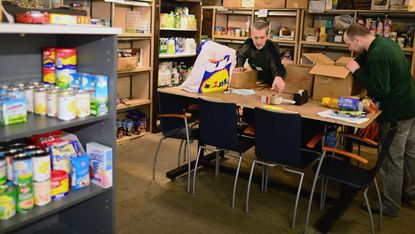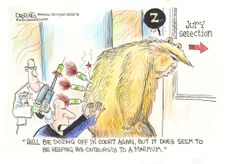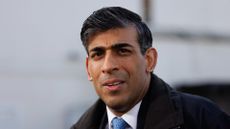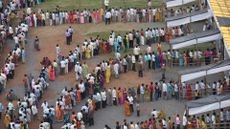Food bank use in UK at record high
Study shows 52% increase in usage in areas where universal credit has been rolled out

The number of people who are dependent on food banks is soaring as welfare benefits fail to cover basic living costs, a new study warns.
Annual figures from The Trussell Trust, the UK’s biggest food bank network, show that a record 1.3 million food parcels were given to an estimated total of 666,000 people in 2017-18 - a 13% increase on the previous year.
In areas where the Government’s universal credit scheme has been fully rolled out for 12 months or more, the figures were even more damning, with a 52% increase in emergency food packages recorded.
Subscribe to The Week
Escape your echo chamber. Get the facts behind the news, plus analysis from multiple perspectives.

Sign up for The Week's Free Newsletters
From our morning news briefing to a weekly Good News Newsletter, get the best of The Week delivered directly to your inbox.
From our morning news briefing to a weekly Good News Newsletter, get the best of The Week delivered directly to your inbox.
The Northwest remains the region with the greatest demand for food banks, with 197,182 food parcels handed out last year, of which 74,577 were for children, Sky News reports.
Emma Revie, the Trust’s chief executive, said: “This is completely unacceptable. We need to move towards a UK where no one needs a food bank’s help, not a country where charity provision is the only defence from utter destitution.
“It’s hard to break free from hunger if there isn’t enough money coming in to cover the rising cost of absolute essentials like food and housing. For too many people, staying above water is a daily struggle. It’s completely unacceptable that anyone is forced to turn to a foodbank as a result.”
Problems in the roll-out of universal credit, including long waiting times for payment, has also forced many people into debt, ill health and rent arrears, the Trust says.
However, the Department for Work and Pensions insisted that universal credit was “working for the vast majority who claim it”, and that the Trussell Trust’s research was based on a small sample and carried out before “significant improvements” were made to the system.
A spokesperson for the department told the Financial Times: “The reasons why people use food banks are complex, so it’s wrong to link a rise to any one cause.”
Create an account with the same email registered to your subscription to unlock access.
Sign up for Today's Best Articles in your inbox
A free daily email with the biggest news stories of the day – and the best features from TheWeek.com
-
 5 sleeper hit cartoons about Trump's struggles to stay awake in court
5 sleeper hit cartoons about Trump's struggles to stay awake in courtCartoons Artists take on courtroom tranquility, war on wokeness, and more
By The Week US Published
-
 The true story of Feud: Capote vs. The Swans
The true story of Feud: Capote vs. The SwansIn depth The writer's fall from grace with his high-flying socialite friends in 1960s Manhattan is captured in a new Disney+ series
By Adrienne Wyper, The Week UK Published
-
 Scottie Scheffler: victory for the 'pre-eminent golfer of this era'
Scottie Scheffler: victory for the 'pre-eminent golfer of this era'Why Everyone's Talking About Masters victory is Scheffler's second in three years
By The Week Staff Published
-
 Will Aukus pact survive a second Trump presidency?
Will Aukus pact survive a second Trump presidency?Today's Big Question US, UK and Australia seek to expand 'game-changer' defence partnership ahead of Republican's possible return to White House
By Sorcha Bradley, The Week UK Published
-
 It's the economy, Sunak: has 'Rishession' halted Tory fightback?
It's the economy, Sunak: has 'Rishession' halted Tory fightback?Today's Big Question PM's pledge to deliver economic growth is 'in tatters' as stagnation and falling living standards threaten Tory election wipeout
By Harriet Marsden, The Week UK Published
-
 Why your local council may be going bust
Why your local council may be going bustThe Explainer Across England, local councils are suffering from grave financial problems
By The Week UK Published
-
 Rishi Sunak and the right-wing press: heading for divorce?
Rishi Sunak and the right-wing press: heading for divorce?Talking Point The Telegraph launches 'assault' on PM just as many Tory MPs are contemplating losing their seats
By Keumars Afifi-Sabet, The Week UK Published
-
 How would a second Trump presidency affect Britain?
How would a second Trump presidency affect Britain?Today's Big Question Re-election of Republican frontrunner could threaten UK security, warns former head of secret service
By Harriet Marsden, The Week UK Published
-
 'Rwanda plan is less a deterrent and more a bluff'
'Rwanda plan is less a deterrent and more a bluff'Instant Opinion Opinion, comment and editorials of the day
By The Week UK Published
-
 How the biggest election year in history might play out
How the biggest election year in history might play outThe Explainer Votes in world's biggest democracies, as well as its most 'despotic' and 'stressed' countries, face threats of violence and suppression
By Harriet Marsden, The Week UK Published
-
 'Good democracies include their poorest citizens. The UK excludes them'
'Good democracies include their poorest citizens. The UK excludes them'Instant Opinion Opinion, comment and editorials of the day
By The Week UK Published